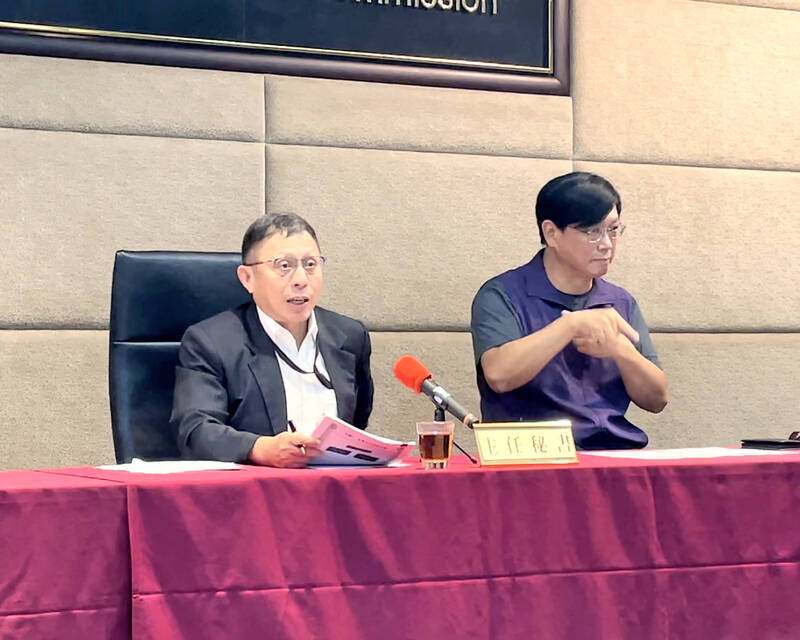People whose telecom access has been restricted or cut multiple times due to their involvement in telecom scams would be listed as high-risk users and would be limited to three telephone number applications for three years, the National Communications Commission (NCC) said yesterday.
The policy is one of the measures to be implemented by the regulator following the passage of the Fraud Hazard Prevention Act (詐欺犯罪危害防制法) in July.
The commission has formed a united front to deter telecom fraud with the National Police Agency (NPA), the National Immigration Agency (NIA) and the High Prosecutors’ Office, NCC Secretary-General Huang Wen-je (黃文哲) told a news conference.

Photo: Lin Chih-yi, Taipei Times
To help prevent telecom services from being used to commit fraud or other crimes, the commission is working with telecoms, the NPA and the NIA to develop a system that would allow telecoms to access the NIA database and the NPA’s 165 anti-fraud hotline, Huang said.
The connections are expected to be operational from November, he said.
If telecoms are notified by police that they need to reauthenticate the identity of an applicant, they can use the databases to verify the information, he said.
“If telecoms are notified multiple times to stop or restrict a user’s access to services due to their involvement in telecom fraud, the nation’s three telecoms must list the user as ‘high risk,’ meaning they would only be allowed to apply for one telephone number or one service from each company for three years,” he said.
The NCC is discussing with NPA officials how many times the telecoms should be notified before they can blacklist a user, Huang said, adding that the matter should be finalized before the end of this year.
Although the measure would not prohibit high-risk users from applying for services from more than one provider, they can expect many questions whenever they apply, NCC officials said.
The act would also tackle fraud arising from the abuse of international roaming services offered by high-risk offshore telecom operators.
People need not use their real names to purchase roaming services online, also known as blackberry cards, nor do they always need to present two forms of identification.
The act requires telecoms to verify whether the person who seeks to activate an international roaming service actually enters Taiwan, and they can do so by accessing the NIA’s database, Huang said.
The NCC is assessing the criteria it would use to determine whether an offshore telecom is a high-risk operator, including the number of times their services are used to commit fraud and whether they sell prepaid services without requiring two forms of ID.
To properly address disputes arising from the use of international roaming services, Huang said that the commission would take into consideration whether the country where a potential high-risk offshore telecom is based in has a mutual legal assistance deal with Taiwan.
“We would also monitor if the services offered by the high-risk offshore telecom were implicated in fraud reported in other countries or by international organizations,” he said.

The manufacture of the remaining 28 M1A2T Abrams tanks Taiwan purchased from the US has recently been completed, and they are expected to be delivered within the next one to two months, a source said yesterday. The Ministry of National Defense is arranging cargo ships to transport the tanks to Taiwan as soon as possible, said the source, who is familiar with the matter. The estimated arrival time ranges from late this month to early next month, the source said. The 28 Abrams tanks make up the third and final batch of a total of 108 tanks, valued at about NT$40.5 billion

A group from the Taiwanese Designers in Australia association yesterday represented Taiwan at the Midsumma Pride March in Melbourne. The march, held in the St. Kilda suburb, is the city’s largest LGBTQIA+ parade and the flagship event of the annual Midsumma Festival. It attracted more than 45,000 spectators who supported the 400 groups and 10,000 marchers that participated this year, the association said. Taiwanese Designers said they organized a team to march for Taiwan this year, joining politicians, government agencies, professionals and community organizations in showing support for LGBTQIA+ people and diverse communities. As the first country in Asia to legalize same-sex

MOTIVES QUESTIONED The PLA considers Xi’s policies toward Taiwan to be driven by personal considerations rather than military assessment, the Epoch Times reports Chinese President Xi Jinping’s (習近平) latest purge of the Chinese People’s Liberation Army (PLA) leadership might have been prompted by the military’s opposition to plans of invading Taiwan, the Epoch Times said. The Chinese military opposes waging war against Taiwan by a large consensus, putting it at odds with Xi’s vision, the Falun Gong-affiliated daily said in a report on Thursday, citing anonymous sources with insight into the PLA’s inner workings. The opposition is not the opinion of a few generals, but a widely shared view among the PLA cadre, the Epoch Times cited them as saying. “Chinese forces know full well that

Travel agencies in Taiwan are working to secure alternative flights for travelers bound for New Zealand for the Lunar New Year holiday, as Air New Zealand workers are set to strike next week. The airline said that it has confirmed that the planned industrial action by its international wide-body cabin crew would go ahead on Thursday and Friday next week. While the Auckland-based carrier pledged to take reasonable measures to mitigate the impact of the workers’ strike, an Air New Zealand flight arriving at Taipei from Auckland on Thursday and another flight departing from Taipei for Auckland on Saturday would have to